Coordinating Office for Global Health
Peace Corps Is Common Path to CDC Career
A Few Fast Facts about Peace Corps Volunteers
- To date, there have been 187,000 Peace Corps volunteers and trainees
- Total number of countries served is 139
- Average age of a volunteer is 28
- Six percent of volunteers are over 50. The oldest is 79
- 59 percent are female; 41 percent are male
- 93 percent are single; 7 percent are married
For more on the Peace Corps, go to their web site. http://www.peacecorps.gov/index.cfm?shell=learn.whatispc
Peace Corps Leads to CDC Career for Many
The Peace Corps was officially established on March 1, 1961. It traces its roots and mission to 1960, when then Senator John F. Kennedy challenged students to serve their country in the cause of peace by living and working in developing countries. From that inspiration grew an agency of the federal government devoted to world peace and friendship. Many CDCers trace their public health roots to the Peace Corps –some even refer to the "peace corps gene" of many CDC staff.
Anthropology and Africa Attract Denise Roth Allen
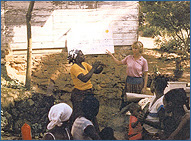
Denise Roth Allen, behavioral scientist, Division of HIV/AIDS Prevention, is an anthropologist working on the Behavioral Surveillance Team (BST) in the Behavioral and Clinical Surveillance Branch. From 2001-2003 Allen was an EIS officer in the Division of Reproductive Health. Since 2003, she´s been in the Division of HIV/AIDS Prevention. She was in the Peace Corps from 1982 to 1986 in Gabon, Central Africa.
From 1982-1984, Allen taught beginning and intermediate English courses to seventh and eight grade students in a small rural town. "From 1985-1986, I extended my Peace Corps service to work as Peace Corps health educator in a maternal and child clinic," says Allen. "I helped train village health workers in home-based oral re-hydration and helped organize neighborhood growth monitoring clinics for children under age five."
Because of her experience working on maternal and child health issues in Gabon, she decided to get an MPH after her return home. "During the last quarter of my MPH program at UCLA, I took a course in medical anthropology and absolutely loved it! The anthropological approach to research reminded me a lot of my Peace Corps experience…living with and learning from people from a different culture. As a result, I decided to pursue doctoral studies in Anthropology. My doctoral research took me back to Africa, this time to Tanzania, where I conducted ethnographic research on women´s experiences of pregnancy and childbirth."
Her Peace Corps experience is still paying off, she says. "As part of my current job, I´ve helped develop the formative research guidelines for the National HIV Behavioral Surveillance System, which include the use of qualitative research methods. From time to time, I´ve also had opportunities to collaborate with CDC colleagues who work on international health issues. My experience as a Peace Corps health volunteer in Gabon was invaluable in that it had a direct impact on my career choice to become a cultural anthropologist working in public health."
Allen, who speaks French and Kiswahili, says it takes openness, flexibility, a willingness to learn, a respect for other ways of doing things, and a sense of humor to work effectively in different cultural settings.
Jody Brooks Organized Soccer League for Street Kids

Joseph (Jody) Brooks is a Physical Activity Fellow, Division of Nutrition and Physical Activity who has been at CDC since May 2005. He served in the Peace Corps in Kingston, Jamaica, from 1999 to 2003. "Ever since I was a youngster my family and I were always involved with a number of community service projects. Joining the Peace Corps was an opportunity to continue to serve, but on an international stage."
Brooks worked for two years as a project officer for a non-governmental organization. "It’s funny, when I tell people I served as a Peace Corps volunteer in Jamaica, they often think that it was the ‘Beach Corps.’ The reality is that although Jamaica has world-class resorts and beaches, many in the country still live in the third world. While there I started an island-wide, under-16 soccer league for street kids, was awarded a grant to transform two open lots into community green space areas, and organized five community basketball coaching certification clinics and five community basketball kids’ camps."
"From 2001-2003, I was a Peace Corps volunteer leader and worked in the Peace Corps Jamaica Headquarters. As a liaison between the volunteers and staff I planned trainings and developed resources with the Program and Training Officer, conducted site visits, managed the US Agency for International Development (USAID) Small Projects Assistance grant, and created a grant-writing handbook for Peace Corps volunteers."
In 1994, Brooks participated in the Public Health Summer Fellowship program, so he already had an interest in public health. "Realizing how integral regular physical activity is to both mental and physical health as a Peace Corps volunteer, influenced my decision to pursue a career in public health. I now work in the Division of Nutrition and Physical Activity, so the community-level work experience I had as a Peace Corps volunteer translates nicely to the work I do now with state and local health departments and our national organization partners."
"I am a big supporter of Peace Corps and the work we have done and continue to do," adds Brooks. "I would encourage more capable, open-minded, resourceful people, regardless of age, to consider becoming a volunteer at some stage in their life. I would be a much, much better Peace Corps volunteer now, after having worked at the CDC, then I was…and I still thought I was a pretty darn good volunteer! CDC employees have a lot of skills they could share with people around the world."
Brooks, who speaks some Jamaican Patois, French, and Japanese, says it is important to go into the experience with an open mind. "If you have your own agenda it will become apparent very quickly. You have to learn the culture and the history of the people or community in which you want to work. One of the most important things you need to do is demonstrate your intentions to the community. If they don´t accept you or believe that you are there to help them, then you will never succeed. The community needs to own any project that they are involved in. Sustainable development is key for any lasting impact."
to the top
Richard Davis Focused on Guinea Worm Eradication in West Africa
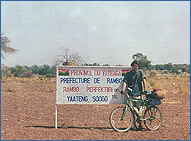
Richard Brannon Davis, senior program analyst, Office of Global Health coordinates global health activities at NCEH-ATSDR and oversees multiple water/sanitation projects in Latin America and the Caribbean. He’s been with CDC for 3 ½ years. He served in the Peace Corps from 1999 to 2001, in Rambo, Burkina Faso, West Africa. Davis says, "I wanted to put my international affairs education into practice and learn development on the ground." So he became a health volunteer in Rambo, where his focus was Guinea worm eradication.
"The core of development is health and education," he says. "After coming back to attend grad school, CDC was an obvious choice as the next step. I use my experiences from Peace Corps everyday. I work with governments and international organizations all over the world, especially in water-san activities. Without the knowledge of living somewhere for two years and seeing the challenges many communities face in the developing world I would have no firm understanding on how to proceed with projects and activities on the ground and be successful."
Over the recent President’s Day weekend, Davis visited two great friends he met in the Peace Corps eight years ago. "I am seeing my friend Will and his Burkinabe wife Kartou raise two beautiful twins in San Diego and my friend Anne from DC enjoying her new job at the State Department."
The people bring back happy memories, he says. But there were tense times too. "The bad- oh just being caught in a little coup d´etat on Christmas eve in Abidjan, Cote d´ Ivoire in 1999. The machine guns going off all night weren´t quite as nice as church bells usually are!"
Davis, who speaks "rusty French," says "The reality is it takes time to gain trust and to get buy-in from local counterparts. Taking the time to build strong relationships will help lead to sustainability."
to the top
Contaminated Water in Kazakhstan Pushes David Hunter into Public Health
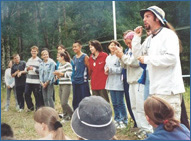
David Hunter, public health advisor, (LTJG, USPHS) with the Division of Global Migration and Quarantine, assists with the development of training and education activities for CDC staff and external partners that include Customs and Border Protection, Border Patrol, state and local health departments, and airlines. He’s been with CDC for over a year. He served in the Peace Corps in Kazakhstan from 1999-2001. "I graduated college unsure of what I wanted to do, but eager to get out and get my hands dirty working somewhere far away. I wanted to tackle the challenge of working in a foreign language within a different culture. I figured Peace Corps would give me the satisfaction of contributing to a foreign community, as well as the adventure of international travel and discovery."
So he taught English as a second language for his primary assignment. Hunter also developed and directed after school programs which included an environmental awareness group and a cinematography group. "The film club wrote, directed and edited short films in English. The project was designed to provide the participants (high school students) progressively more control over the production of the films."
Hunter lived in a small village with heavily contaminated water. "As I taught English to middle and high school students, half the class would be out sick and I began to think that the health of the community was a much larger and more important concern. At the same time, I met a USAID employee (also a former PCV) who was working on HIV/AIDS issues and I found that we shared the same values of public service and commitment to public welfare and community wellbeing. The combination of these two factors pushed me toward a career in public health."
There is nothing more valuable than working within a society that thinks and operates in a completely different way, Hunter explains. "It´s helpful when working among others with perceptions, understandings, and ways of thinking that are different from my own. The bottom line, in my opinion, to successfully work in a different cultural setting is to be flexible and patient."
Hunter says, "Unfortunately, I´m losing my Russian language skills each day." But of his Peace Corps experience he says, "I´d do it again in an instant."
to the top
Peter Kilmarx Battles Tough Living Conditions in Congo to Help Build Fish Ponds
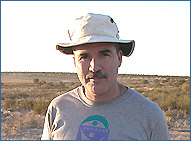
Peter H. Kilmarx, MD, Chief, Epidemiology Branch, Division of HIV/AIDS Prevention, (CAPT, USPHS) served in the Peace Corps from 1984 to 1986 "I was a fisheries volunteer in Democratic Republic of Congo (ex-Zaire) living as the first and only westerner in a small village. It was very simple living conditions in a thatch roof mud hut with no electricity or running water. I worked with about 20 farmers and their families in about a 20 kilometer radius and together we built about 25 tilapia fish ponds. I am still in touch with them by mail and they continue to raise fish."
Kilmarx continues, "I became interested in public health observing that there were infant deaths every year from measles and wondering how that could happen when we had an effective measles vaccine."
The living conditions were difficult he says, because of poor nutrition, frequent malaria, filarial, giardia, bot flies, etc. But although it was tough personally, he says it helped to give him a strong familiarity of central African culture, people, and development and health issues. "It also gave me a near universal appreciation for life in rural villages in developing countries. The Peace Corps is an important network socially and professionally, including many people at CDC and USAID."
Kilmarx says he was invited to take part in the Ebola Kikwit 1995 response because of his prior experience in DRC. Another skill he picked up, he says, is "I can take a two-stroke motorcycle engine apart and put it back together!"
In his job today, he has used Congolese proverbs on several occasions. "Most recently when addressing a CDC/Atlanta meeting of the Minority AIDS Research Initiative, I noted that bidi bikengela kulala mu nzubu wa muntu mukuabo bua kumanya mvula udi ulota muaba kayi which is to say that ‘you have to sleep in another man´s house to know where the roof let´s the rain in’ and therefore it was very appropriate for CDC to want to develop the capacity of minority researchers to address the HIV/AIDS epidemic in U.S. minority communities. The saying was very well received by the audience."
to the top
Suzanne Marks Worked with Village Women, Turning Small Businesses into Success Stories for Entire Families
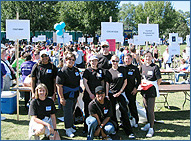
Suzanne Marks is an epidemiologist in the Clinical and Health Systems Research Branch in the Division of Tuberculosis Elimination of the NCHHSTP. She’s been at CDC since 1997. She served in the Peace Corps from 1983 to 1985 in Togo, West Africa. "I entered the Peace Corps after completing my coursework for a master´s degree in Economics, with a specialty in economic development theory. I first decided to join the Peace Corps during a political science internship in Washington, DC, after hearing former Peace Corps Director Dick Celeste tell volunteers´ stories of overcoming incredible challenges. Peace Corps fit in with my studies and personal goals; I wanted real world experience in international development and wanted to help others."
Marks was a rural development volunteer who worked with over 400 village women grouped into 22 weaving, dry-season gardening, and soap-making small businesses. "I helped them become self-sufficient in their organizations, develop bookkeeping systems, and solve problems that arose. The bookkeeping systems qualified the groups to obtain accounts at the credit union from which they could obtain loans and make investments in lucrative projects. The business groups also became social groups that helped individual members in financial need or those in poor health."
Working daily with women who got up at the crack of dawn, fed and cared for their families, worked all day cultivating the fields or selling goods at the marketplace, often with one child attached to their back and others in tow, she saw the inextricable link between health and economic well-being. "Health problems of women immediately created problems for their whole family. On the other hand, economic successes of the women immediately translated into benefits for the entire family. I was very cognizant of that [nutritional] aspect of health, but, I also became aware of the critical nature of reproductive health for women living in a culture in which they had little to no control over their fertility. I personally knew one young woman who died after a back-alley abortion attempt and another who nearly died. When I returned to the US, I finished up my master´s degree in economics while working at USDA and then took a job in family planning, where I become increasingly involved in efforts to address HIV. Not long afterwards, I decided to continue studies in public health at Johns Hopkins. Eventually, I landed here at CDC."
Tolerance and being open-minded to different ways of doing things are essential to working effectively in different cultures, Marks adds. "Nearly every Peace Corps Volunteer develops and exhibits the ‘can do’ attitude," Marks says. "Although working together at CDC in the South is sometimes a challenge, since I identify as a member of a minority culture (LGBT persons--lesbian, gay, bisexual, transgender) that is often the object of discrimination and homophobia. I could also add that being a woman and a non-physician also presents some challenges at CDC."
She highly recommends Peace Corps Service to any adult, she says. "There is no upper age limit. It vastly expands your experiences and network of friends, who eventually become like family." Marks speak French and some Spanish.
to the top
Peace Corps Led Helen Perry to International Health Career
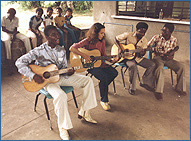
Helen Perry is a training specialist and team leader for Integrated Disease Surveillance and Response in the African region. She’s been at CDC ten years. She served in the Peace Corps in Morocco from1965 to 1967. "I joined the Peace Corps because I wanted a service opportunity, I had an adventurous spirit, I was a good language learner, and I was inspired by the idealism of the early 60s."
Perry worked in a provincial hospital laboratory in Meknes, Morocco, and in a TB hospital in Rabat, Morocco. "In Meknes, I worked in the microbiology, blood banking, and public health water testing ‘departments.’ At the TB hospital, we performed microscopy and cultures."
She got into public health because of her husband, Sam Perry who recently retired from CDC after 34 years. "I married Sam in 1966 while we were still in Peace Corps in Morocco. In addition to his domestic posts with CDC, Sam also had several overseas assignments (the former Zaire, Nepal, and India) where we spent more than 15 years and raised our family. Public health was the narrative that surrounded our life story and we grew up in the business with many wonderful friends and folks who went on to become outstanding public health leaders. I was lucky to get to know and learn from all of them. While our children were being raised, and while we were overseas, I was an educator and taught English, science and languages. When we returned definitively to the US, I started working as a training developer for WHO global health programs. Then I came to CDC."
Perry says she recognizes many Peace Corps experiences as relevant to her job today, "including the need to practice cultural sensitivity and the need to use what you have at hand to get the job done. You just try to make it happen even if you don´t have the latest bells and whistles. Also, I think my grassroots experience of working in local laboratories and health centers helps me to keep in mind the strengths and limitations experienced by our colleagues at all levels in our partner countries in Africa and Asia."
She recalls, "We used to have a midday break when I worked in the lab in Morocco. We would work from 7:30 a.m. -12:30 p.m. and then return from 3:30 to 6:30 p.m. I still miss taking a midday nap!"
Perry says working in another culture takes patience. "One needs to spend time with people in their own context and work side by side with them. It can be on a routine task, or on some special problem. But the point is to be there and to share in the consequences. Things may not move as quickly or as smoothly as one would like, but the important thing is to share the experience (good or bad) with folks in their own time frame. I also think it takes respecting the different processes and conditions that different settings present and accepting that you don´t always have all the answers. You have to be willing and open to having your own assumptions, sensations and world view challenged and questioned almost daily."
She speaks French and has also studied Spanish, Italian, Moroccan Arabic and Lingala.
to the top
Peace Corps Taught Matthew Stockton Flexibility, Sensitivity and Patience
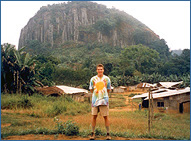
Matthew Stockton, MPH, public health advisor, GAP/IPDB, says, "My Mom worked all over the world for Shell Oil and my Dad was in Vietnam with the International Voluntary Service teaching English in the early 1960s, so I guess it was inevitable that I would join the Peace Corps. I was accepted into a few Occupational Therapy programs my senior year at Wabash College, but the calling to explore another country and culture was too tempting to pass up."
Stockton was a rural agriculture extension volunteer in Gabon, Africa from 1997-1999. "I worked mostly with village women doing organic gardening. The idea was to help enhance the family’s nutrition and allow the women earn a few extra CFA (Central African Francs) selling their produce in the local markets. As a young man in Peace Corps, I thought I was impervious to falling ill and was careless about my health. I tried to live like the people in my village and did not sleep under a mosquito net, ate nearly everything that was offered to me (including monkey), stopped boiling and filtering my drinking water, and did not wash my hands as often as I should. During my two years in Gabon I got sick, a lot. I had Malaria, Dengue, Giardia, intestinal parasites, and a whole host of other random fevers that Peace Corps volunteers simply dubbed ‘arbo virus illness.’ When I returned to the US in 2000, I decided to pursue a MPH in Communicable Diseases from the University of South Florida. Experiencing many developing countries’ public health issues and diseases first hand definitely was a benefit in graduate school."
Today Stockton is working with the Global AIDS Program (GAP) in the International Operations Team as a Public Health Advisor. "About sixty percent of my time is spent out in the field working on management and administrative issues with our GAP Field Offices. Gabon is a francophone country, so being able to speak French has helped out tremendously in my work some GAP countries such as Cote d’Ivoire, the Democratic Republic of Congo, and Rwanda. Also, my Peace Corps experience taught me the ‘art’ of flexibility, sensitivity, and patience when traveling overseas and dealing with other people and their cultures."
Stockton has been with CDC since the fall of 2002 when he joined the Public Health Prevention Program (PHPS).
to the top
Karen Voetsch Continues to Give Back as President of the Atlanta Area Returned Peace Corps Volunteer Group

Karen Voetsch, MPH, is a public health analyst and acting team lead for Policy, Communications, and Partnerships for the Steps to a HealthierUS Program, which supports community-based chronic disease prevention programs in states, cities, and tribal areas. She’s been at CDC four years.
From 1996 to 1998, she was a health education/community development volunteer in Guinea, West Africa. "After completing my undergraduate education, I was very interested in pursuing volunteer service and was very impressed with the mission and history of the Peace Corps. I also welcomed the opportunity to live in a different cultural environment and learn another language." She speaks French and is conversant in Malinké
As a community development/health education volunteer, Voetsch did many different things, she says. "One of the challenges was that the job was pretty undefined. I started working at the local health center and conducted health education sessions related to malaria, malnutrition, and diarrhea, which were the three most prevalent diseases in my village. Over time I found that women’s health and education were important issues in the community. In collaboration with local school teachers, I organized a girls’ soccer team where the students had an opportunity to exercise and have fun, while also learning about women’s health issues and the importance of staying in school. We also obtained funding to renovate the local middle school and helped organize a regional women’s health conference. I was able to do so many different things and came to appreciate the flexibility of my role as a volunteer."
Her time in the Peace Corps taught her that the physical, cultural, and social environment have a very significant influence on people’s beliefs and behaviors, she says. "After the Peace Corps, I wanted to get a better understanding of the science behind behavior change. Public health was a discipline that supported the things I had learned overseas and provided me with a way to put them into practice."
Voetsch says her Peace Corps experience contributed to her understanding of community health and assists in her current position. "I learned that gaining an understanding of a community’s needs and working in collaboration with community members and stakeholders are instrumental to success. I am mindful of these lessons in working with state, city, and tribal grantees and our national partners. "Many Peace Corps Volunteers will say that they got much more out of the experience than they felt they put into it," she says, "and I have always felt the same way and wanted to continue my involvement with the Peace Corps. One of the many ways that Returned Peace Corps Volunteers ‘give back’ is to organize or become involved in a local organization of returned volunteers to fulfill the third goal of Peace Corps: ‘helping to promote a better understanding of other peoples on the part of Americans.’ "
She says she’s learned a lot about working effectively in different cultural settings and gaining trust and buy in from organizations and communities. "In many cultures, it’s the process that matters and not the outcome, so the ways in which you interact and communicate with people can become much more important than the things you actually achieve. It also takes a good understanding of yourself, your abilities to make a contribution, and your flexibility to roll with the punches with a good sense of humor"
Currently, Voetsch is the President of the Atlanta Area Returned Peace Corps Volunteer Group. "As an association, we provide a supportive community for Returned Peace Corps Volunteers to perform community service, promote global understanding, and advance civic engagement in the Atlanta area. We volunteer in the community, we organize educational and social events, and we fund one major Peace Corps project overseas. If there are other RPCVs out there at CDC, I would encourage them to visit our website at www.aarpcv.org and join the organization."
Sophie Wenzel Extended Tour to Work with People She Had "Lived with and Grown to Love"
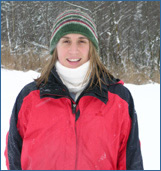
Sophie Wenzel is a PHPS fellow, assigned to the State of Alaska Division of Public Health, where she is coordinating the statewide hair mercury biomonitoring program. She was in the Peace Corps in Paraguay from 1999-2002. "I had always loved travel and learning about new cultures, and I thought Peace Corps would be a great way to continue these interests while serving other people."
She worked as a rural health volunteer in the Chaco desert in Paraguay. "I worked with women, youth and children, promoting infant survival, such as breastfeeding, reproductive health, immunizations, proper nutrition, etc. Most of my work was accomplished doing home visits with women, and youth groups."Wenzel decided to go into public health after she extended her service and stayed a third year as volunteer coordinator in the capital city of Asuncion. "I thought going into public health program management would allow me to help the people that I had worked and lived with and grown to love."
"My Peace Corps experience has taught me to never take myself too seriously, and that it´s always ok to laugh at myself," she says. "It has taught me to remember that we´re all different, have different ways of doing things or approaching problems, and that there is no one right way. I would highly encourage anyone who wants to join to look into it!"
Wenzel speaks French (native language) and also Spanish and Guarani (Indigenous language in Paraguay).
to the top
Laurel Zaks Was Public Health Educator in Ecuador
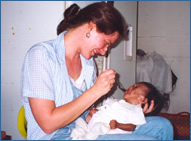
Laurel Zaks is a public health advisor, Coordinating Office for Global Health, and recently responsible for updating the Memorandum of Understanding between Peace Corps and CDC. She’s been at CDC since returning from Peace Corps, February 2001. "I got the job a week after finishing in Ecuador January 2001."
From July 1997 to January 2001, Zaks was in Ecuador. "Having worked as a dietitian and even after having an MPH, I wanted to live abroad longer term than with other opportunities that I had; I wanted to understand public health internationally by living in a community, learn about the culture, and understand the basics of public health in the country." So she served as a public health educator and nutritionist and kept extending her service. "I would tell folks, I just need to stay for one more mango season. In development work, I believe we need to work ourselves out of a job and leave it behind in a sustainable way."
"Initially I lived and worked in the rainforest region working with both the local Ministry of Health and local indigenous organizations, getting to work via hiking in jungle-mud and traveling in dug out canoes along the Amazon River. After a little more than a year, I went on to live in a large Latin city called Santo Domingo de Los Colorados and worked at a Center for Malnourished Children. I also spent a few months in the mountains working with a women´s cooperative on health education. Since 2001 I have been back to Ecuador twice to visit with the communities in the rainforest and with the families and my coworkers at the Center for Malnourished Children."
Zaks worked with the Ecuadorians developing curricula and conducted technical training in Spanish in preventive maternal and child health education and infectious diseases for local health promoters, medical professionals and other volunteers.
Serving as a volunteer as long as she did, she also helped design a new $400,000 Children’s Center for Nutrition Recuperation which served an average of 40 families daily. She supervised transition to the new facility, revised treatment and case management protocols, menus, and the management structure to improve outcomes for patients and families with malnourished children.
Her experiences there "solidified that I wanted to continue working in global health," she says. "I use these and other international work experiences constantly. It allows for a perspective in my more current macro job and draws from a more micro one-on-one provider job. I see all kinds of CDC—projects in the field and often think this is a Peace Corps project only with easier logistics and more funding. Peace Corps is not for everyone but it is amazing if you allow yourself the opportunity to share what you have and be open to learning what living and working in another culture offers."
to the top
Page last modified: March 30, 2007
